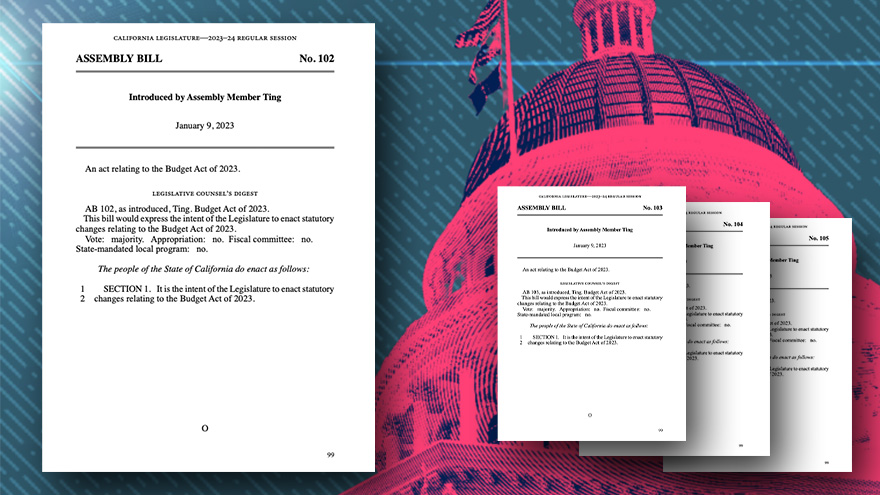In the Democrat stronghold of California, state lawmakers have opted for the opposite strategy: pass blank budget bills that have virtually no text at all, then fill them in later with amendments, also known as “trailer bills.” California’s state constitution requires the legislature to pass a budget by June 15. What lawmakers often do is pass a placeholder bill in mid-June, which can authorize the expenditure of unprecedented amounts of money, but with no details on where those funds will be allocated. State lawmakers are incentivized in two ways to use this process. First, under California law, legislators cannot get paid if they don’t meet the budget deadline. Passing blank bills allows them to avoid lengthy budget negotiations, which could mean missing the June 15 deadline, while in the process losing pay for each day the bill is late. Second, “budget trailer bills are a great way to slip significant policy changes — some of them only tangentially related to the actual budget process — into law without the debate, deliberation and delay that can bedevil much standalone legislation,” as Cal Matters reported. Recent votes to pass the blank budget bills (AB-101, AB-102, AB-103, AB-104, AB-105, AB-106) were supported exclusively by Democrats — not one Republican voted in favor of the measures.At the national level, U.S. politicians often obscure the content of their spending proposals by passing multi-thousand-page omnibus bills within just hours of the full text being released, leaving no time for review 0r evaluation of details that are buried deep in the legislation.
The one line on the most recently passed budget legislation reads: "It is the intent of the Legislature to enact statutory changes relating to the Budget Act of 2023."
California Lawmakers Pass B... by Adrian Norman</ California Assemblywoman Diane Dixon, one of the 18 Republicans who voted against the bills, told Timcast that this amounts to a “blank check” for the government and that it is irresponsible to pass such legislation. “You don't even know what you're voting on, because they have not gone through committee in a normal committee hearing process,” Dixon explained. She says she voted against the bills because “there’s nothing to vote on, there’s no content. It’s a blank check. It’s not responsible governance.” Numerous other officials were asked for comment, but did not provide a statement. Dixon, a former business executive who assumed office during the 2022 midterm elections and is serving her first term in the assembly, added, “I guess the Democrats like to do this. Republicans don’t. Republicans like to know what they're voting on, especially when it comes to fiscal matters.” In California, spending bills must be approved by a two-thirds vote of the legislature. But, trailer bills can pass with just a simple majority, making them a preferable way to bypass the checks-and-balances of the normal budget process. Trailer bills also take effect the moment the governor signs them (compared to regular policy bills, which take effect Jan. 1 the following year) and cannot be overturned by voters with a ballot initiative. The impact of trailer bills can be significant. Last year, California lawmakers pushed through a 48-page energy trailer bill that had a price tag of $53.9 billion. The details of the legislation, which was revealed just days before the final vote, revealed “Equitable” energy pricing, where state residents with higher incomes are charged more for electricity and gas to subsidize energy costs for those with lower incomes, regardless of usage. Under the new law, some lower income residents will pay a fee of as little as $20 per month, while other higher income earners would pay up to $128 per month, a recurring charge separate from actual energy usage. As Cal Matters reported, in 2021, trailer bills were used to pass:
For the 2023-24 budget session, state government documents reveal a lengthy list of 11-pages of trailer bills California lawmakers, along with Gov. Gavin Newsom, are planning to pass and sign into law.
Dixon has blasted the process of using trailer bills as lacking “transparency,” arguing that leadership sitting in a “back room” privately negotiating without any public input or informing the public, then passing legislation on a strict party-line vote, is the wrong way to enact public policy. “It's only Democrat leadership, the party of the governor, who sits in the backroom and decides how much to put in each line item,” Dixon told Timcast. She chuckled, “It’s, um…unique.”

